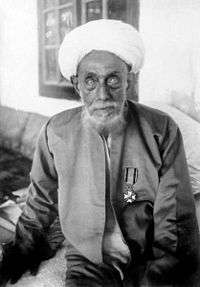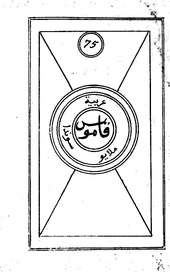Habib Usman bin Yahya
| Habib Uthman bin Yahya | |
|---|---|
|
Habib Uthman | |
| Native name | عثمان بن يحيى |
| Born |
Usman 1822 CE Pekojan, Batavia, Dutch East Indies |
| Died |
1913 (aged 90–91) Batavia, Dutch East Indies |
| Cause of death | Natural cause |
| Resting place | Pondok Bambu |
| Residence | Dutch East Indies |
| Other names | Habib Usman bin Yahya |
| Citizenship | Dutch East Indies |
| Alma mater | Mecca, Medina, Morocco, Algeirs, Egypt |
| Occupation | Islamic scholar, Mufti |
| Employer | Dutch East Indies |
| Known for | Mufti of Batavia |
| Notable work | preaching |
| Home town | Batavia, Dutch East Indies |
| Title | Habib |
| Religion | Islam (Sunni (Shafi'i)) |
| Parent(s) |
Abdullah bin Aqil(father) Aminah(mother) |
Usman bin Yahya, Utsman ibn Yahya or Othman bin Yahya (Arabic: عثمان بن يحيى , translit. ‘Uthmān bin Yahyā; Arabic pronunciation: [ʕuθma:n bin jɑħjɑ:] full name: (Arabic: سيد عثمان بن عبد الله بن عقيل بن يحيى العلوي, translit. Sayyid ‘Uthmān ibn ‘Abdallāh ibn ‘Aqīl ibn Yaḥyā al-‘Alawī) ; 1822 CE/17 Rabi' al-awwal 1238 AH - 1913 CE/21 Safar 1331 AH) was an Islamic scholar and Mufti of Batavia in 19th century of Dutch East Indies.
History
Habib Uthman bin Yahya was born in Pekojan, Batavia in 1822 CE (17 Rabi' al-awwal 1238 AH). Uthman came from the family of Ba 'Alawi sada with his father was Sayyid Abdullah bin Aqil bin Umar bin Yahya. His mother was Aminah, a daughter of the great scholar of Egypt Sheikh Abdurahman Al-Misri.[1] His father, Abdullah, and his grandfather, Aqil, were born in Mecca, while his great grandfather, Umar, was born in the village of Qarah al-Shaikh in Hadhramaut, which later moved and died in the city of Medina. Snouck Hurgronje explained that his grandfather was a respected scholar as Sheikh of Sadah for 50 years and died in Mecca in 1823 CE/1238 AH.[2]
His father moved to Mecca when Uthman was 3 years old, so Uthman was taken care of by his grandfather, Aqil. His grandfather has many other sons, besides the father of Uthman. Many of his sons became scholars in Mecca, such as Sayyid Ishaq, who died in the city of Ta'if, and Sayyid Qasim who continued Agil's leadership as Shaikh of Sada in Mecca.[2]
Uthman died in 1913 CE (precisely on 21 Safar 1331 AH) at more than 90 years of age. He was buried in the Karet public cemetery in Tanah Abang to fulfil his will. Later on, during relocation of the cemetery, his family moved his grave to Kelurahan Pondok Bambu. Now his grave is still well preserved in the south of the mosque Al-Abidin, Pondok Bambu, East Jakarta.[3][4]
Education
Uthman studied Qur'an, Tafsir and other Islamic sciences such as Akhlaq, Tawhid, Fiqh, Sufism, Nahwu Sharaf, Hadith and Astronomy under the care of his maternal grandfather, Sheikh Abdurrahman bin Ahmad Al-Mishri. After the death of his grandfather when he was 18 years old, Uthman went for hajj and met his father and relatives in Mecca. There, for seven years he studied Islamic sciences under his father and to Sayyid Ahmad ibn Zaini Dahlan, the Mufti of Mecca at the time. Uthman continued his journey in the pursuit of knowledge to Hadhramaut 1848. There, He studied under Habib Abdullah bin Umar bin Yahya and his maternal uncle Habib Husein bin Abdullah bin Tahir (later on, one of his teacher's grandson, Sayyid Muhammad bin Agil bin Abdullah bin Umar bin Yahya, married to one of the daughters of Uthman).[2]
He also went to and studied in Egypt and once married to an Egyptian woman. He continued his journey to Tunisia, where he often exchanged ideas with Mufti of Tunisia. From Tunisia he then studied in Algeria and later continued to Morocco to study to various Moroccan scholars. He deepened his knowledge in Shariah in those North African countries before roaming to Syria to meet with scholars in the country. He continued his journey to Turkey, which was still under the Ottoman Sultanate. Later he went to Jerusalem in Palestine before returning to Mecca.[3]
Career
In Rabi 'al-Awwal 1279 AH (1862 CE) he went back to Batavia after 22 years of journey to seek knowledge and settled in Petamburan, Tanah Abang area. Over there, he wrote and compiled books, especially about amalil Yaum (daily remembrances) and books about sins, unbelieving, polytheism and things that contrary to Aqidah. In his life, he has written about 116 books.[3] One of the books he authored, al-Qawānin al-Syar'iyyah li ahli al-Majālisi al-Hukmiyati wal ‘Iftiayati, was even used as a reference in the religious courts system in Indonesia at least until the 1950s.
To make ends meet of him and his family, Uthman founded his own printing company named Pertjetakan Batu. More than that, his lithographic printing press is the first in Indonesia and became pillar of the spreading intellectualism in the society.[5]
He also opened his Majelis Taklim (a gathering to seek religious knowledge) which was attended by many people including some other scholars from all over Batavia and surrounding areas, Among his students was Habib Ali Alhabsyi.[3] He also plays an important role in the founding of Jamiat Kheir, an education foundation in Batavia in 1908.
Uthman bin Yahya was appointed as Mufti of Batavia in 1871 (1289 AH). The Dutch government paid him monthly stipend since 1889 until his death to advice on Islamic policy, with the title of Honorary Adviser for Arab Affairs in 1891.[6] As a mufti, many parties criticized Habib Uthman for his closeness with the Dutch orientalist, Snouck Hurgronje. Hamid Algadri in his book[7] wrote that his proximity to Snouck Hurgronje was based on his belief at that time that he (Snouck) was a Muslim. He did not know that Snouck only pretended to convert to Islam. The cooperation between Hurgronje and Uthman bin Yahya began when Hurgronje was still in Leiden as suggested in one of Hurgronje's letter on July 8, 1888 CE (28 Shawwal 1305 AH). After his arrival in Batavia in May 1889, Snouck Hurgronje discussed with the newly appointed Governor General Cornelis Pijnacker Hordijk the possibility to employ Sayyid Uthman in colonial administration. Snouck also nominated Uthman as his assistant with allowance of 100 Guldens. Snouck suggested himself pays Uthman discreetly to avoid diminishing his authority among Muslims. All Snouck's requests were granted by the colonial administration[8]
Usman bin Yahya was also active in local politics. Along with Hugronje he interfered the appointment of a new Kapten Arab in Batavia in 1901 by supporting and pushing 'Umar Manqush instead of Balwael as the candidate. On March 27, 1905 he was appointed as a native member of the municipal council of Batavia in 1905, but resigned on July 27, 1905. He most probably accepted the brief position under pressure from Snouck.[9]
Habib Uthman's attitudes in politics were sometimes quite controversial, especially in his position on jihad and Holy War, particularly concerning a riot against the Dutch in Cilegon, Banten. Although Habib Uthman had good reason in his argument, many scholars considered him as a colonial stooge. Moreover, he was also hard against mystical practices, as he wrote in the book Manhaj al-Istiqamah. In a letter dated March 26, 1891, Snouck wrote about Sayyid Uthman's opinions in regards to jihad which was interpreted incorrectly by some Indonesian Muslims: "Many people were 'misled' by some law doctrines of jihad, and they thought that a Muslim person is justified in the presence of God to do acts such as to take possessions of the unbelievers, Chinese or dutch people for himself ... "[4] Uthman also assisted Hurgronje by issuing fatwa to support the Dutch war against Aceh.
Among other incidents which drew the ire of Batavians and Singaporean Arabs was Habib Uthman's reading of prayer on the occasion of the coronation of Queen Wilhelmina in 1898, at which time the Orde van de Nederlandsche Leeuw (Order of Netherlands Lion) was conferred on him. Calling him as friend of unbelievers, his opponents condemned Habib Uthman in letters to the Arabic Press and pamphlets printed in Singapore.[10]
Books written and published
Usman published religious books in Arabic and Malay (written in Jawi script) on his own lithographic press.
References
- ↑ Syamsu As, Muhammad (1996). Ulama Pembawa Islam Di Indonesia Dan Sekitarnya. Seri Buku Sejarah Islam. 4 (2 ed.). Lentera. ISBN 978-9798880162.
- 1 2 3 "Menelusuri Jejak Keturunan Mufti Betawi" (in Indonesian). Retrieved September 1, 2014.
- 1 2 3 4 "Habib Usman bin Abdullah bin Yahya". Retrieved September 1, 2014.
- 1 2 "Habib Usman bin Yahya, Sang Mufti Batavia Pada Abad 19" (in Indonesian). June 8, 2008. Retrieved September 4, 2014.
- ↑ Muhammad, Noufal. "Habib Utsman bin Yahya, Sang Mufti Betawi" (in Indonesian). Retrieved September 4, 2014.
- ↑ Green, Abigail; Viaene, Vincent, eds. (2012). Religious Internationals in the Modern World: Globalization and Faith Communities Since 1750. Palgrave Macmillan. p. 240. ISBN 978-1-137031716. Retrieved September 4, 2014.
- ↑ Algadri, Hamid (1994). Dutch Policy Against Islam and Indonesians of Arab Descent in Indonesia. LP3ES. ISBN 978-9798391347.
- ↑ Abushouk, Ahmed Ibrahim; Ibrahim, Hassan Ahmed, eds. (2009). The Hadhrami Diaspora in Southeast Asia: Identity Maintenance Or Assimilation?. 107. BRILL. p. 43. ISBN 978-9-004172319. Retrieved September 4, 2014.
- ↑ Kaptein, Nico J.G. (2014). Islam, Colonialism and the Modern Age in the Netherlands East Indies: A Biography of Sayyid ʿUthman (1822 – 1914). BRILL. ISBN 978-900-4278707. Retrieved Aug 18, 2015.
- ↑ Freitag, Ulrike; Clarence-Smith, William G., eds. (1997). Hadhrami Traders, Scholars and Statesmen in the Indian Ocean, 1750s to 1960s. 57 (illustrated ed.). BRILL. ISBN 978-9-004107717.

